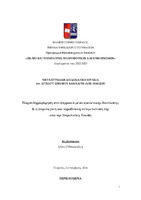Παραπληροφόρηση στα ψηφιακά μέσα κοινωνικής δικτύωσης & η στρατηγική και νομοθετική αντιμετώπιση της από την Ευρωπαϊκή Ένωση

View/
Keywords
Παραπληροφόρηση ; Ευρωπαϊκή Ένωση ; Fact checking ; Social media ; DSA ; Ελεγκτές γεγονότων ; Disinformation ; ElectionsAbstract
Disinformation nowadays has reached enormous proportions. The increasing use of
social media, which is an important source of information in people's daily lives, has
contributed to the growth of this phenomenon. In the aftermath of important elections,
it has become clear that through widespread campaigns of disinformation and fake
news there can be an impact on citizens.
States in this wake have tried with their own initiatives to address the phenomenon
and to limit the major social media platforms, sometimes more strictly and sometimes
more moderately. At the same time, the European Union has undertaken a series of
initiatives to tackle disinformation, while evaluating past initiatives that have not
proved effective in the long term. In addition, there is concern when suspicious content
of false news is removed with the counter-argument of infringing freedom of speech.
Indeed, there is this fine line that is explored in depth in this Thesis. Finally, fact
checkers have been called upon to play an important role in combating this
phenomenon.
In this thesis an analysis of the phenomenon of disinformation and its manifestations
is carried out. A detailed reference is made to legislative initiatives of states aimed at
addressing the phenomenon, the protection of users and the delimitation of platforms.
Reference is made both to efforts to self-regulate the platforms themselves and to
important court decisions on the fine line between removing suspicious content and
defending fundamental rights. In addition, the European effort against this
phenomenon is discussed in detail, and an entire chapter is devoted to the role that
fact-checkers are called upon to play.


